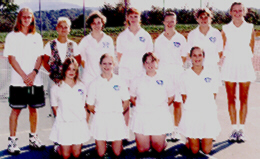
The West Henderson Falcons tennis team.
Jennica is in the top row, third from the left.
She played the number one position on the team.

Jennica Humphrey tapped the ball in a silent rhythm, glanced over the net at her waiting opponent, and tossed the ball high over her head. Her racquet swung around in a smooth arc as she skimmed the ball diagonally over the net across to the service court. Jennica sprinted to the center of the court, feet spread and knees bent, ready for the return shot. The ball shot back like a bullet deep into the back court. Jennica turned, quickly pulled back her racquet and drilled a wide strong forehand. The ball shaved the tape on the top of the net and deftly dropped at her opponent's feet. The match between the North Carolina West Henderson Falcons girls' tennis team and their arch rivals had begun. Today Jennica was playing as the number three seed. Not bad for a fifteen year old who had only picked up a racquet eighteen months ago!
Jennica is used to meeting challenges head on and working hard toward success. When she was two-and-a-half years old, Jennica was struck with the deadly virus spinal meningitis. In a somber sterile hospital room, the doctors told Mr. and Mrs. Humphrey, "Your daughter will be blind, retarded, or have hearing problems." Two days later the family knew that little Jennica's cochlear, an organ in the inner ear, was severely damaged and Jennica was deaf.
While other toddlers jabbered and learned to talk, Jennica watched silently from her world of isolation, but her parents were researching a new and experimental procedure called a "cochlear implant," which enables the non-hearing person to detect tones, volume, and some form of words. Unlike a hearing aid, which amplifies sound, the implant receives and passes on electrical signals that imitate the now-useless nerves in the inner ear.
When Jennica was seven years old, the procedure of drilling a small indention in the skull and implanting a miniature receiver was approved for children. In a white-sheeted aseptic operating room, an otolaryngologist implanted a mini-22 system of electrodes into his tiny patient's ear and placed the miniature receiver in a grooved indention on her head. He connected a thin wire from the electrodes to the receiver. Jennica would wear an external transmitter on her scalp hidden by her fluffy blonde hair. The internal system was connected to a sound processor the size of a small Walkman (and carried like one) and to a tiny microphone that resembles a hearing aid.
This may sound complicated. It may be, but this innovative electronic device has enabled a portion of the 250,000 profoundly deaf people in the United States to hear tones, volume, a computer-like voice. A combination of the input from the cochlear implant and lip-reading has opened the door into the hearing world.
The match ended. Jennica's wavy hair had escaped the blue-and-white visor set back on her forehead, shading her large green eyes from the late afternoon sun. Her white team shirt was wet with perspiration, and her face was damp with disappointment.
"I know I could have won," she told her mother and the other gathered spectators.
"You played a great match and didn't give up," said Coach Stout, putting her hand on Jennica's shoulder.
Jennica's eyes rested on her coach's face as she watched her lips and listened carefully. Flashing a friendly smile that showed her straight white teeth, she said, "Thank you, but I wish I could have won."
Jennica is used to winning. Everyday she faces challenges that other people don't even think about. Watching her on the court, no one would guess that Jennica's balance depends on her eyesight. Because of damage to her inner ear, she can lose her balance if she closes her eyes.
"I don't go around thinking that I'm deaf and life is too hard. Through hard work I can now communicate nearly as well as anyone and have even begun talking on the telephone," said Jennica.
Jennica takes challenges in stride and continues to make straight "A's" at her local high school. She sits close to the front where she can see the teacher's face. The school provides a person who takes notes so Jennica can cross-reference her own notes during a lecture and study them after tennis practice.
"My favorite way to spend my free time is to play tennis. Other than that, I love to work on my computer and try to program new games," relates the attractive girl in a soft high ranged voice. An avid reader, Jennica reads everything from Time Magazine to fantasies and mysteries.
Because of her strong determination and the benefit of the cochlear implant, Jennica will continue to succeed. She uses her losses as stepping stones up to her next match in life. In tennis or in life you may hear someone call out, "Advantage, Jennica!" because she will continue to face constant daily challenges with confidence and by sheer will and grit turn them into personal victories. Hats...er, visors... off to Jennica!
Return to: |
Contact us: |
 |